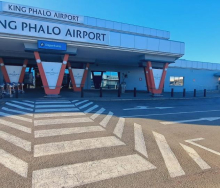ACCOUNTS for the Default
Insurance Programme
(DIP) are back on track
after claims last year exceeded
premiums collected, placing
the insurer in a loss position
and threatening the future
of the programme (see TNW
December 5, 2018).
Charmaine Brogden, the
chief fund management
executive of the DIP, which
is underwritten by Lloyd’s of
London, told TNW that while
the fund suffered huge losses
in October-November last year,
the scheme was running well
and the accounts were now
on track.
She said she had seen an
increase in turnover of 30%
over the past three months.
Changes are also being
made to the scheme to
safeguard its success. “To
further mitigate the default
risk, the DIP will look at
segmenting the market into
three distinct categories,” said
Charmaine.
The premium has also
increased from R11 to R22
per ticket. “We know that there
will be agents out there who
feel that this is a steep rise,
however the price has stayed
the same now for three years
and that in itself is unusual
because one would expect to
see the premiums rise at least
with inflation,” she said. “If
we can show a positive result
for 2019 and that means the
scheme runs at a profit then
we can always relook at the
premiums for 2020 with a view
to reducing them.”
She adds that agent defaults
have had a negative impact on
the scheme for everyone.
According to Charmaine,
there have been six claims
during the period that the
scheme has been running.
“The reference to default is
two-fold as some agents go
into technical or administrative
defaults which will result in
suspension from Iata until
all outstanding amounts are
brought up to date. Defaults
not brought up to date result
in a final claim with the
DIP and the subsequent
termination of the agent from
Iata and the DIP .”
Last year, Ian Snowball,
director of Bastion Reinsurance
Brokerage, the intermediary
for DIP in this market, said
while a significant proportion
of agencies were participating
in the scheme, the portion of
ticket sales was proportionally
smaller. “For the scheme to
operate at optimum level we
need as many ticket sales
as possible and that means
attracting the bigger agencies
into the facility,” he said.
According to Charmaine, the
programme has had some
success attracting some of the
bigger agencies. “We now have
the ability to accommodate
those agents who require a
guarantee that is larger than
the basic R5 million on offer by
the DIP .”
Default insurance is an
alternative to the bank
guarantees required by Iata.
Just over a year ago, Iata’s
Global Default Insurance was
rolled out in South Africa. It is
offered by Euler Hermes.
Perry Flint, Iata head of
Corporate Communications,
North America, said GDI was
a standardised global default
insurance policy held by Iata
and made available for travel
agents to be covered under
on a voluntary basis. “GDI is
not replacing local ‘Default
Insurance Programmes’, which
continue to exist in a number
of markets, including South
Africa.”
Unlike DIP’s per ticket fee,
the GDI is based on an annual
fee. The GDI website describes
it as “a quick, efficient, hasslefree alternative” to bank
guarantees and bonds.
“The travel agent pays one
annual GDI fee based on
their financial security
requirement.”
DIP overhauled after rocky year
19 Aug 2019 - by Tessa Reed
Comments | 0













